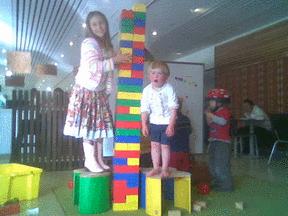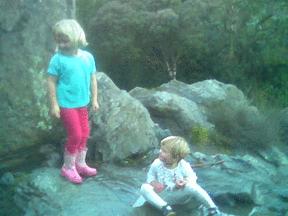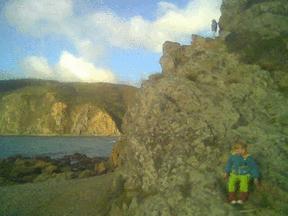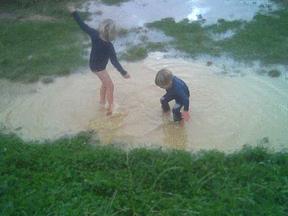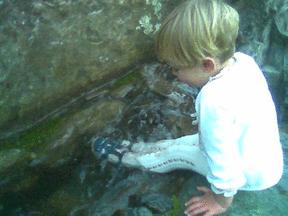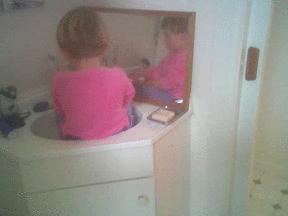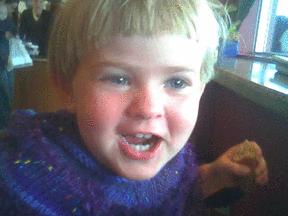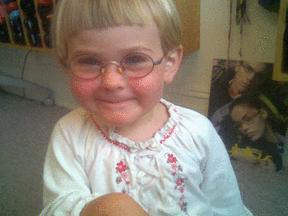Casey (whose racing name was
Chatham Lass although that link doesn't think she did much racing) was pleased to see Iris and Hazel and accepted their adoration and the present with kind grace. A while later
Tam and I took four small children and one white dog up into the misty paddock and Tam and a friend got Casey to run. At first Casey was a little confused about what we wanted "They can't want me to run, it's not flat, there's no other dogs, I'm not wearing my special face thing... they seem keen though, I'll do a bit of running and see what they think... oh, that was successful, they're calling me a
good dog and asking me to do it again... oooh, now I think about it that was wonderful, I feel great!... great!... great but tired. I guess I'll stop." It was lovely to see her joyfully flying up and down the hill. I asked Iris what she thought and she said "Casey good running, big running, good big huge running! Fast!"
Our playcentre is really into considering the children's schemas when considering their learning. Schemas are a way of talking and thinking about repeated thought-patterns in children's play. We find this way of thinking helps us to interact with our children because it seems they repeat these sorts of patterns because they are passionately interested in them. When they are passionately interested in something they are deeply engaged and that's when they learn the most. When we come to the children willing to listen and talk about the things they are passionately interested in, they are often willing to talk and listen to us too, which means we can support and scaffold their learning easily.
Hazel and Iris have
trajectory schemas. They each have some other schemas as well but they are both deeply fascinated by things moving fast. The trajectory schema is common ground for much sisterly bonding and Casey is an embodied trajectory; everything about her suggests her potential for speed. They watched her run as if it were an exam or a revelation. Their interest in Casey has had me helping them find pictures of dogs of different breeds and talking about each breed's history, we've looked at dogs and talked about the differences and similarities between them, we've guessed at whether they're fast or strong by looking at the outward evidence of their biology. Iris is trying her hardest to get exactly the right words to express her admiration for Casey's speed and grace, and Hazel has been thinking about how she might seem to Casey, who has very different ways of thinking. This holistic, continuous self-directed learning is obviously good for people and it's exactly what Te Whaariki (the early childhood curriculum) is about. But Hazel is 4, and it is normal to go to school at 5 in New Zealand.
I quite liked primary school. I still have some friends from then, and somehow I've managed to turn "you think you're so smart" back into an affirmation over the last 20 years. But I think I might have been smarter if I'd not gone to school. I remember having a huge vocabulary ready on the tip of my tongue for every occasion. It was not an asset, so I decided to pretend to forget the word whenever I was about to use one I didn't think my schoolmates would like because it was too long and latinate. After a few months that forgetting became real.
School never supported me in researching something that I was passionately interested in. Some of the assigned projects did seem more interesting than others but it was made very clear to me very shortly after starting that there were about 30 people in the classroom and that in order to get along as well as possible with 29 of them it was a mistake to impress that last one. School never gave me the impression that I should try stretching myself, that giving it my best shot and failing was better than not trying, or that outstanding success was better than fitting in.
But I'm happy now. I have a lovely family and wonderful friends. If I hadn't been to school and made those trade-offs would I have managed the social successes that are what really make the difference between loneliness and joy?
I'm sure my children are ordinary enough that they would do okay at any school. I believe our local schools are all quite good, as schools go, one of them even has a Montessori strand. But if it were as easy socially to choose home-schooling as it is to choose to bake all your own bread it would be an easier choice.
"Some of us like to make our own clothes, others want to grow their own vegetables... Jack and I like to educate our own children!" p277 Putting the Joy Back into Egypt: An Experiment in Education by Jean Hendy-Harris
As is I feel we're making the choice again for Hazel I made for myself as a child: and so I'm asking myself, with all the clarity of hindsight, is it better to be very clever or almost normal?



